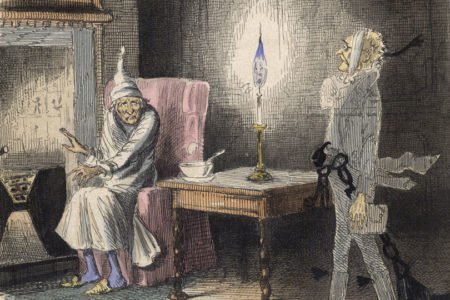Christ: The Hope of Nations
For believers in Jesus Christ, it is an unwavering given that our one, only, and true hope lies in our Savior. Everything else is shifting sand. For me, the book of Colossians sums up this truth magnificently, reminding us that God has made known to us a great mystery, namely, “Christ in you, the hope of glory” (Col. 1:27).
Though each day’s dismal headlines cast a long shadow over what often seems to be our hopeless culture, the individual hope we have in Christ burns ever brightly and ever surely. He is our personal Hope, the “anchor” of our souls (Heb. 6:19).
But what about the world or, for that matter, our nation? Can we say that the only true hope for America lies in Jesus Christ? When the radical advocates of the “separation of church and state” hear such talk, they immediately bellow that Christians are trying to turn our democracy into a theocracy like Iran’s. That notion, of course, is absurd. Our Founders placed their hope for America on the truth of Christianity. But, as important as the American historical record is, it is not enough. We must go to something much more foundational.
Here are the questions, then: What is America’s hope? And where do we find it?
One National Tree, Three Branches
In the book of Nehemiah we read a dramatic account of what happened when Israel’s political leader (Nehemiah) and religious leader (Ezra) helped usher in national repentance and revival. Nehemiah 9:33–34 makes the distinction between God’s faithfulness and justice on the one hand and Israel’s collective disobedience on the other:
However You are just in all that has befallen us; for You have dealt faithfully, but we have done wickedly. Neither our kings nor our princes, our priests nor our fathers, have kept Your law.
There is an important logic to the three groupings: First come the kings and princes (our political system); second, the priests (our religious system, such as the church); and last, the fathers (our families).
Here, then, are the three areas we must evaluate in diagnosing the cause of America’s moribund spiritual health and in prescribing a cure.
Heretical Theology in Religion
Since a fateful U.S. Supreme Court decision in 1947, which unjustifiably erected a wall of separation between church and state, our legal philosophy in church/state cases has slid downhill. (See “America’s Historical Amnesia”) But its downfall is not America’s sole problem. It has merely been the framework for the bedevilment of America’s soul. The real corruption has been among the “priests” of religion who teach and preach false notions of God and His Word, as in Nehemiah’s day.
Although the so-called quest for the historical Jesus in the late 1800s was accompanied by a liberal view of the authority of Scripture, it was in the 20th century that this poisonous fruit finally blossomed.
To see how quickly this downward slide has taken place, let’s look at two popular, mainstream publications on the subject of Christianity. The first is a special issue of Life magazine, published on Christmas, December 25, 1964. It dealt exclusively with the Bible. Although it was a secular, general-market publication, it still evidenced a genuine sense of reverence for the principles of Christianity and the Bible:
To Christians, God’s most sensational intervention in history was the life and death of Jesus, which made the divine pattern partly manifest…the Story of the Bible that ends with John’s vision of Jesus’ second coming has continued for 1,900 years without a second coming. Instead it has given believers a hope that sustains them in this life on earth, where the harvest of human accomplishment in history surpasses all that went before. The hope is not dead and the harvest not fully gathered yet.1
Now look at the position taken about 42 years later, also near Christmas, in a December 18, 2006, cover story in U.S. News & World Report. The outside cover reads, “In Search of the Real Jesus—New research questions whether he was more teacher than savior.” This article gives huge play to the “Gnostic gospels” written hundreds of years after the deaths of the reliable, first-century witnesses to the actual Jesus of Nazareth. The Gnostic writings were not widely regarded until the mid-20th century. The Gnostic view eliminates the historicity of Christ’s death as the sacrifice for all sin and creates a heretical view of Him as a philosophical, spiritual force bereft of any redemptive role.
Yet the Gnostic heresy is given an upper hand in the conclusion of the article, which is supposed to be devoted to a discussion of the person of Christ:
The Gnostic perspective is unlikely to wither even under such forceful attacks…The Gnostic claim that the truth lies within fuels an argument so deep and old—and indeed so fundamental to who we think we are—that it is hardly surprising that it finds expression in our contemporary culture wars. And unlikely that it will cease doing so in the culture wars to come.2
Such popular treatments of Jesus as a persona in confusion rather than as a Savior in reliable history merely reflect the degeneration of Bible scholarship regarding the New Testament. Radical, liberal religious thinkers who are part of the Jesus Seminars have concluded—based on biased presumptions and low respect for the Bible text itself—that only 16 percent of the events in the Gospels involving Jesus probably happened and are worthy of our confidence.3 It is no wonder then, that the person of Christ tends to become blurred and indistinct to the modern mind: a fuzzy, speculative, moral teacher—but not a Savior, not Lord, and certainly not the Son of God.
Hapless, Helpless Families
The Bible is clear that the family has the primary responsibility to transmit faith from generation to generation. By God’s design, the family is to be a moral and spiritual greenhouse where eternal values and principles are grown. Then, when children can understand, hopefully they will adopt these principles personally and make thoughtful, individual decisions of faith in Jesus Christ.
This process is laid out masterfully in Scripture, particularly in Deuteronomy 11:19–21, where parents (fathers, in particular) are commanded to honor God’s precepts and share them with their children:
You shall teach them to your children, speaking of them when you sit in your house, when you walk by the way, when you lie down, and when you rise up. And you shall write them on the doorposts of your house and on your gates, that your days and the days of your children may be multiplied in the land.
Where are we as spiritual role models for our children? Christian pollster George Barna has made some sobering conclusions. Deriving his results from American adults who identify themselves as born-again Christians, here is what he found:
Less than half use the Bible as a source of life principles and standards.
Only 2 people out of 10 (20 percent) rely on the values and views taught to them by their parents.
A scant 20 percent say that religious ideas or teachings shape their moral decisions.4
Judging by this data, Christian families in America are in deep trouble. We cannot expect our children to understand Christ as the ultimate source of all hope if our lives do not consistently proclaim this truth.
Heaven-Sent Revival
It is no accident that the Great Awakening—that evangelical revival that swept through the American colonies in the early 1700s—preceded America’s miraculous independence from England, the world’s most formidable economic and military empire at the time. The revival instructed the hearts and souls of families and leaders concerning God’s understanding of liberty and man’s individual responsibility toward Him.
Afterward our Constitution was drafted with a tripartite system of checks and balances bred from the understanding of men like James Madison who believed, as the Bible teaches, that mankind is infected by an inherent sin nature; thus our institutions must be built on that presupposition.
The ideas of religious freedom contained in the First Amendment were not supposed to guard the government from the influence of Christianity, but precisely the converse: Belief in Christ was deemed so precious a liberty that government was forbidden to regulate, prohibit, or interfere with it.
This year we celebrate the 400th anniversary of the founding of Jamestown, Virginia. In these last 400 years, we have witnessed both the steady decline in the legal right to participate in public acknowledgments of God and an alarming rise in heretical ideas about Christ and the Bible. And Christian families are, at least statistically speaking, failing to live out the truth of the gospel fully and effectively before their children.
What is America’s hope? It is and always will be the Lordship of Jesus over the lives of its citizens. Where Jesus is Lord, our institutions will improve; truth rather than heresy will flourish; and families will grow strong. We need spiritual revival.
And that revival must begin with you and me. Psalm 96:2–3 commands us, “Proclaim the good news of His salvation from day to day. Declare His glory among the nations, His wonders among all peoples.”
With such good news and such a great Savior, let’s not wait another hour. Let us give our lives wholly and abundantly, while it is still day, to exemplify the revolutionary truth that Jesus Christ is King of kings and Lord of lords, before whom every nation, kindred, and tongue shall ultimately bow.
ENDNOTES
- Dorothy Seiberling, ed., “Man’s Eternal Dialogue with God,” Life 57, no. 26 (December 25, 1964): 7.
- Jay Tolson, “The Gospel Truth—Why Some Old Books Are Stirring Up a New Debate About the Meaning of Jesus,” S. News & World Report 141, no. 23 (December 18, 2006): 79.
- Robert Funk, ed. The Acts of Jesus—What Did Jesus Really Do? (New York: HarperSanFrancisco, 1998), 1.
- George Barna, Think Like Jesus (Brentwood, TN: Integrity Publishers, 2003), 20.







Most excellent article; I pray American families will take heed.
Thank you Mr.Parshall